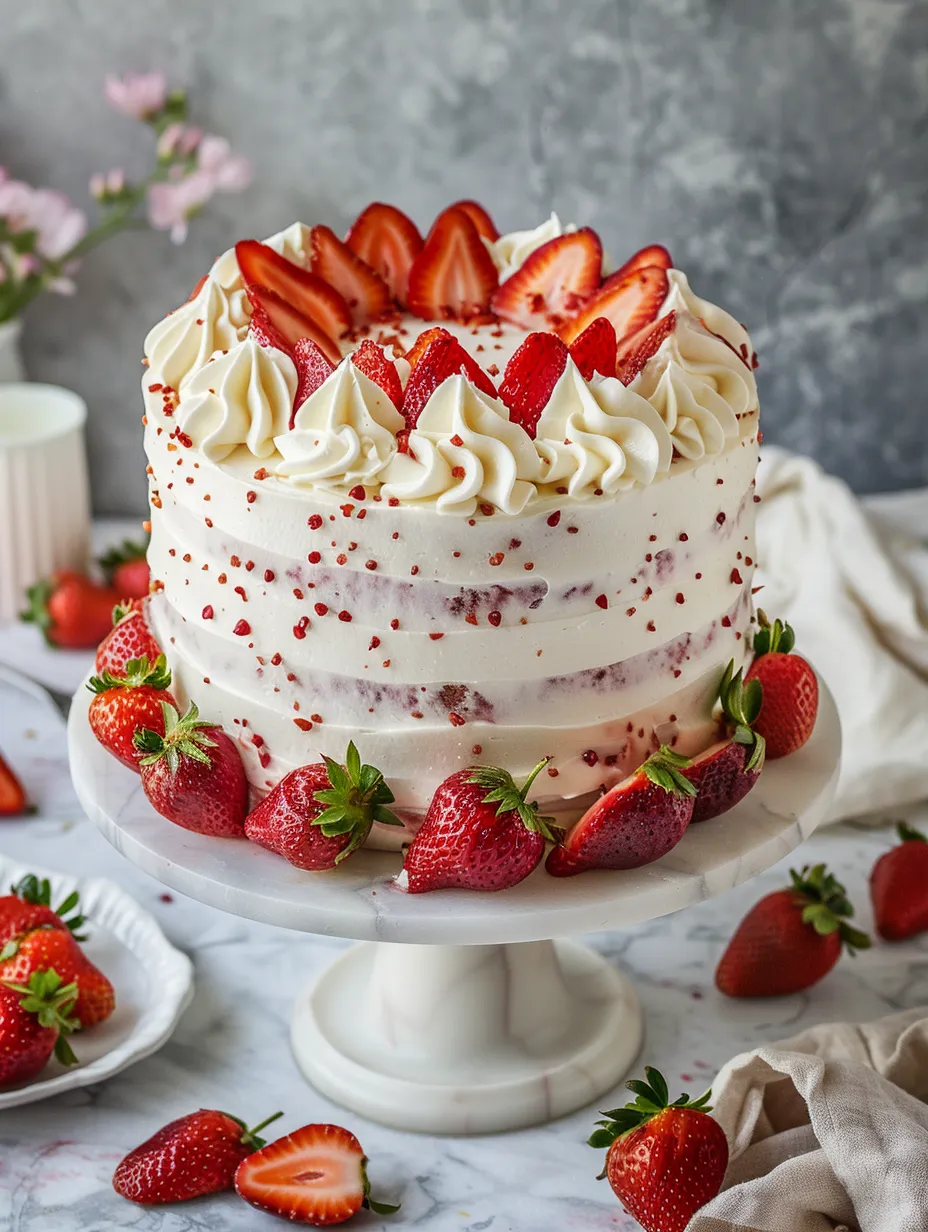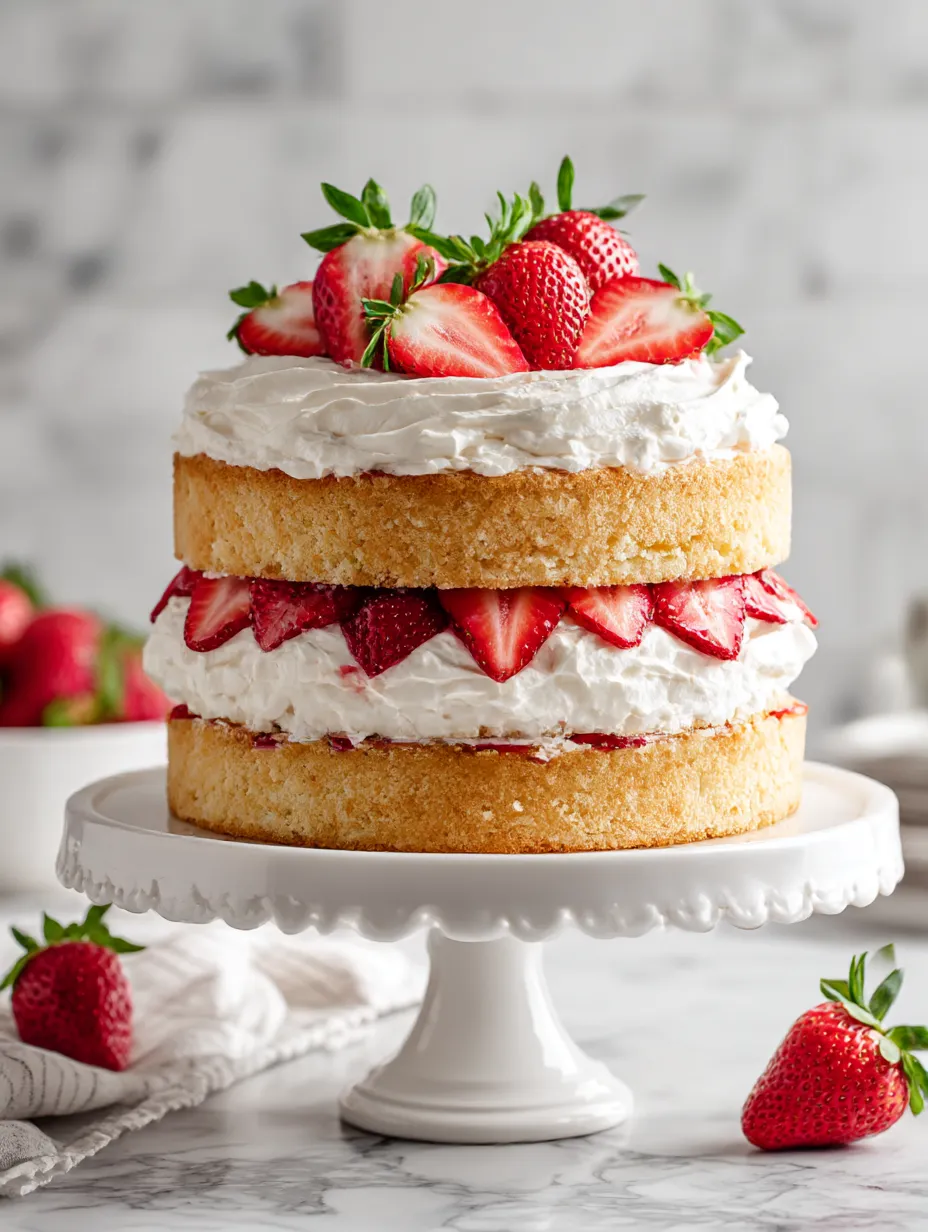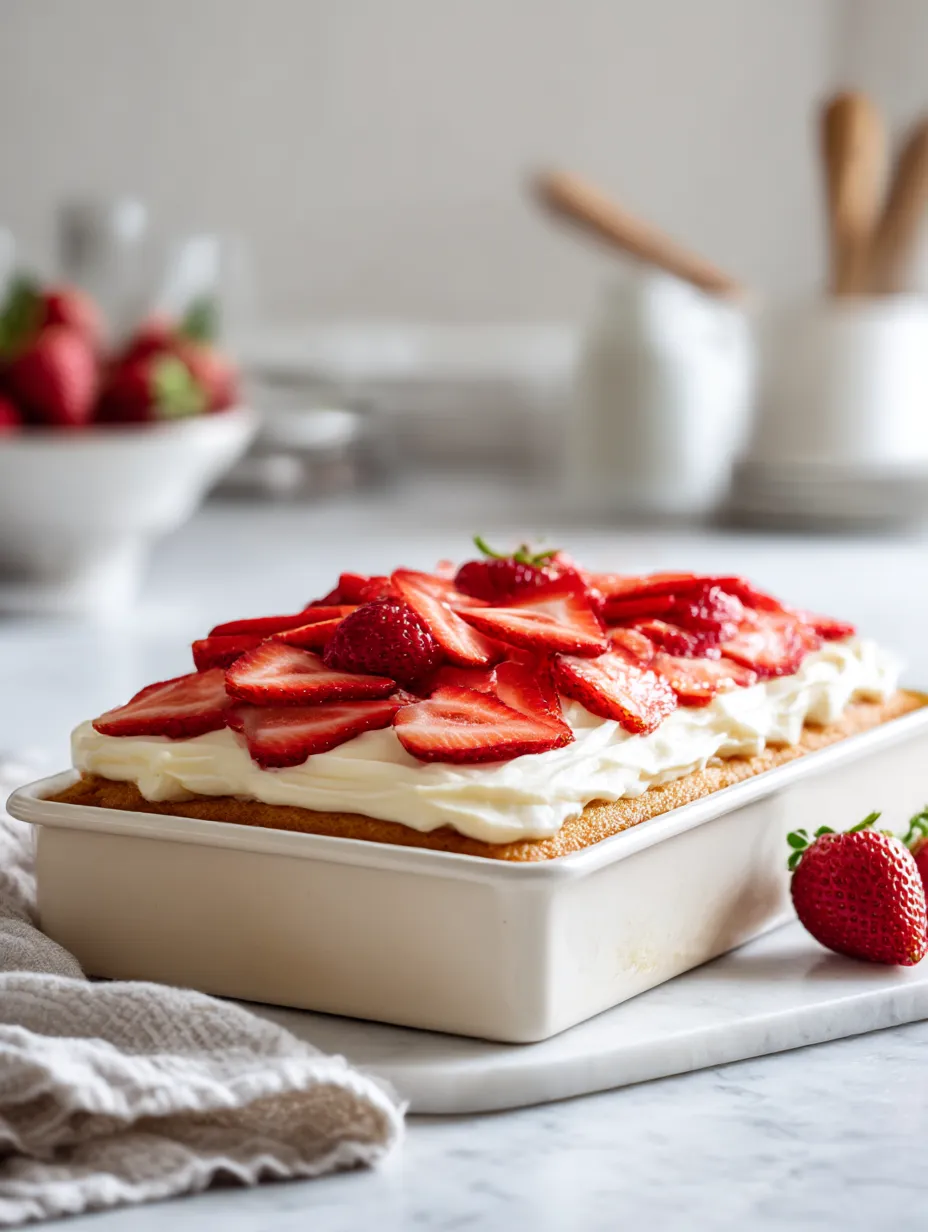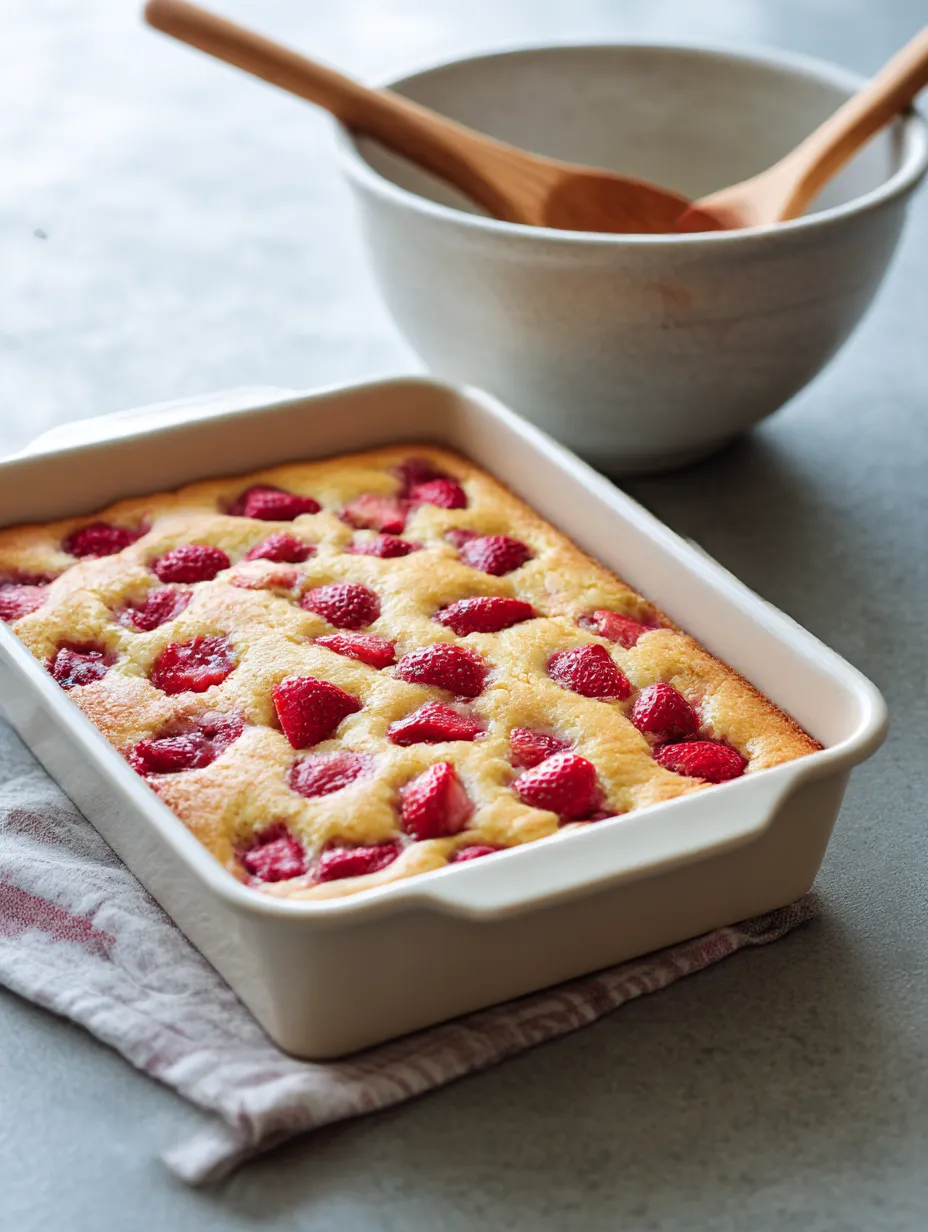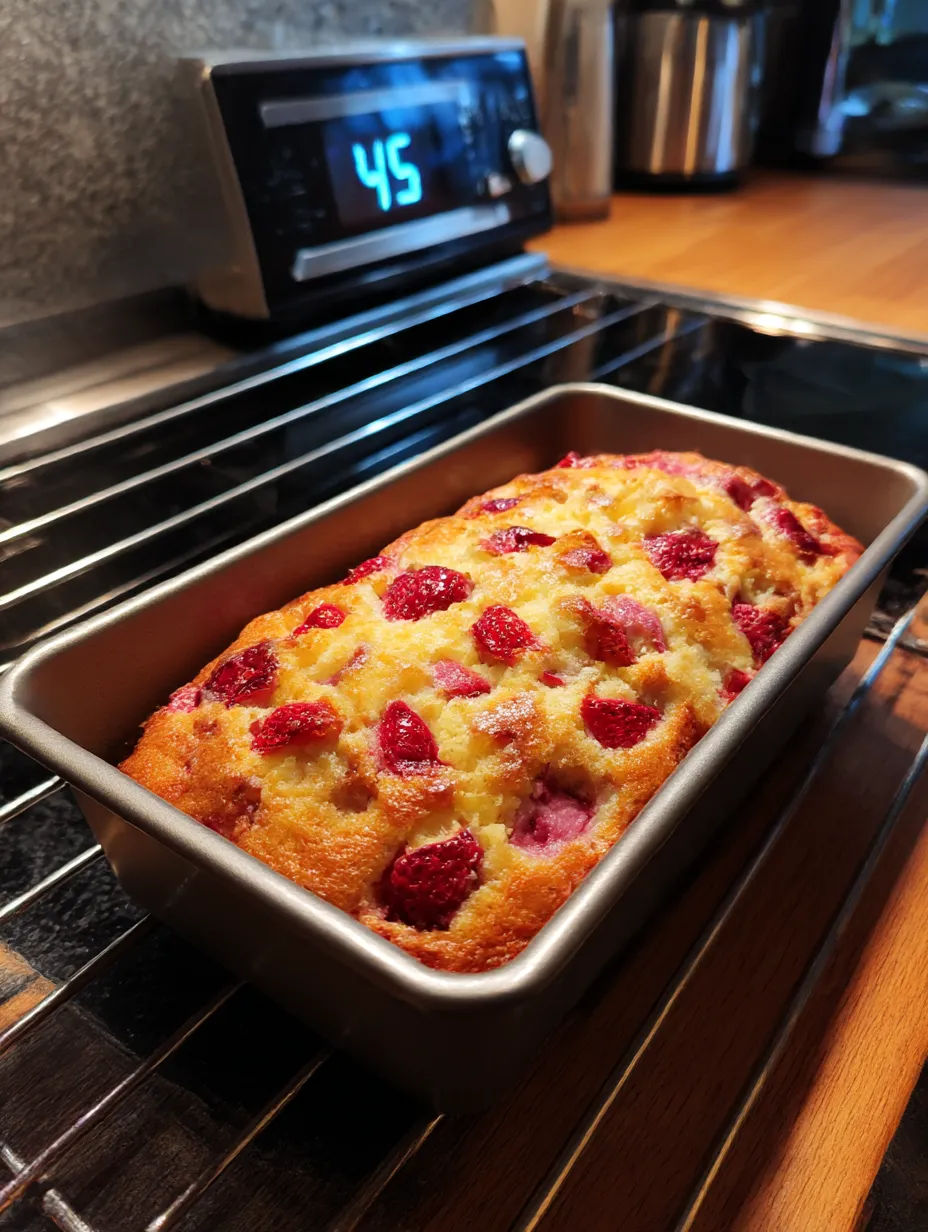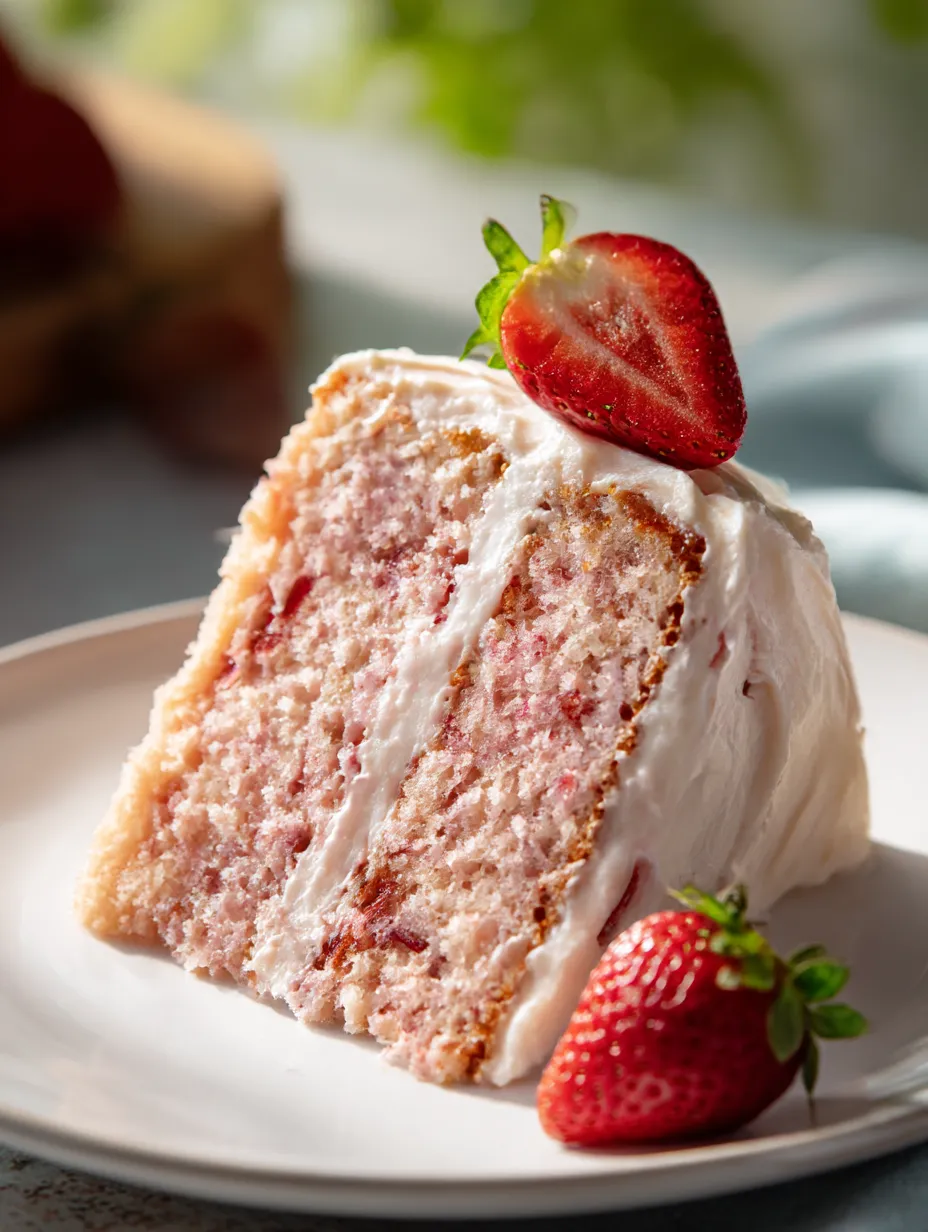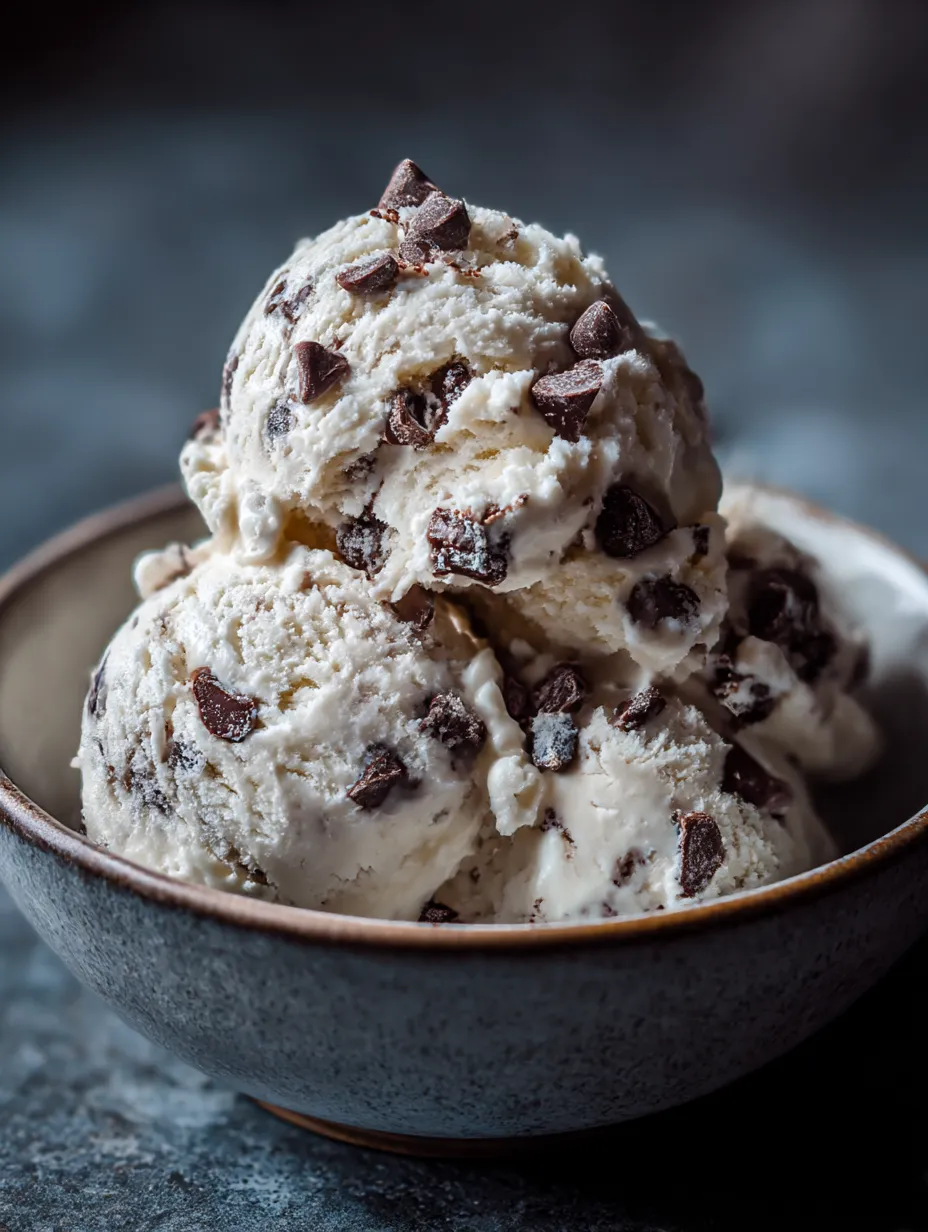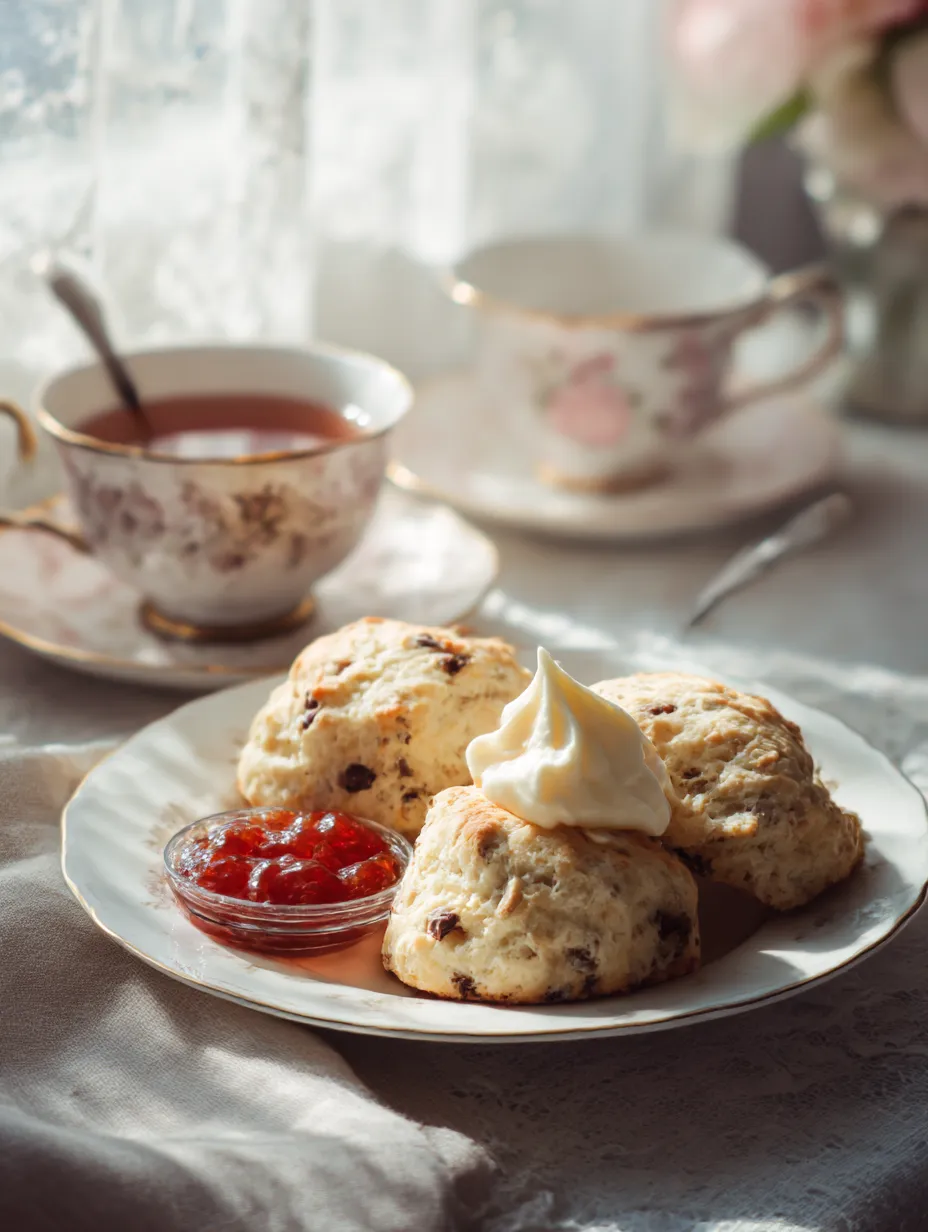Strawberry cake recipes can transform any ordinary day into a celebration, but finding the perfect one that actually works can be frustrating. It was my daughter’s 8th birthday, and I had promised her the most beautiful strawberry cake she’d ever seen. Three hours before her party, I pulled what I thought would be my masterpiece from the oven – only to watch it collapse into a sunken, dense disaster. That moment of panic taught me everything I know about strawberry cake recipes today. The frantic research, emergency grocery run, and successful second attempt not only saved the party but launched my decade-long journey of perfecting every possible variation of strawberry cake you can imagine.
If you’re here searching for strawberry cake recipes, you’ve probably experienced your own baking frustrations or simply want to create something special. Whether you need an easy strawberry cake for a weeknight dessert or an impressive centerpiece for celebrations, this comprehensive guide will walk you through everything from simple strawberry cake methods to elaborate strawberry cake from scratch creations that’ll have everyone asking for your secret.
Table of Contents
Why I Love Strawberry Cake (And You Will Too)
Strawberry cake holds a special place in my heart beyond that birthday disaster. Growing up, my grandmother would make her famous strawberry shortcake every June when the berries were at their peak. But it wasn’t until I started experimenting with different strawberry cake recipes that I discovered how versatile and forgiving this dessert can be.
What makes strawberry cake so appealing? Unlike chocolate or vanilla cakes that can be heavy or one-dimensional, strawberry cake offers the perfect balance of sweetness and bright, fruity flavor. The natural acidity in strawberries actually helps create a more tender crumb, while the beautiful pink color makes any occasion feel festive.
Over the years, I’ve served strawberry cakes at birthday parties, baby showers, spring gatherings, and even elegant dinner parties. Each time, I’m amazed by how this simple combination of strawberries and cake can transform an ordinary day into something memorable.
Essential Ingredients: What I’ve Learned Through Years of Testing
Fresh vs. Frozen vs. Freeze-Dried Strawberries
The strawberry debate kept me up at night during my early baking years. I remember spending an entire weekend testing the same recipe with different strawberry preparations, much to my family’s delight (and slight annoyance after the fifth cake).
Fresh strawberries create the most authentic flavor but can add excess moisture that affects texture. I learned this the hard way when my first attempt at adding fresh berries resulted in a soggy bottom that never quite set.
Frozen strawberries work beautifully when properly prepared. The key insight I discovered: always thaw and drain them completely, then pat dry with paper towels. The concentrated flavor actually intensifies during freezing, creating a more pronounced strawberry taste.
Freeze-dried strawberries became my secret weapon after a fellow baker shared this tip at a local baking group. Ground into powder, they add incredible flavor without any moisture issues. This discovery revolutionized my strawberry cake game.
The Flour Factor
Through countless experiments, I’ve found that all-purpose flour works best for most strawberry cake recipes. Cake flour creates a more delicate crumb but can sometimes be too tender when combined with the fruit’s natural acids.
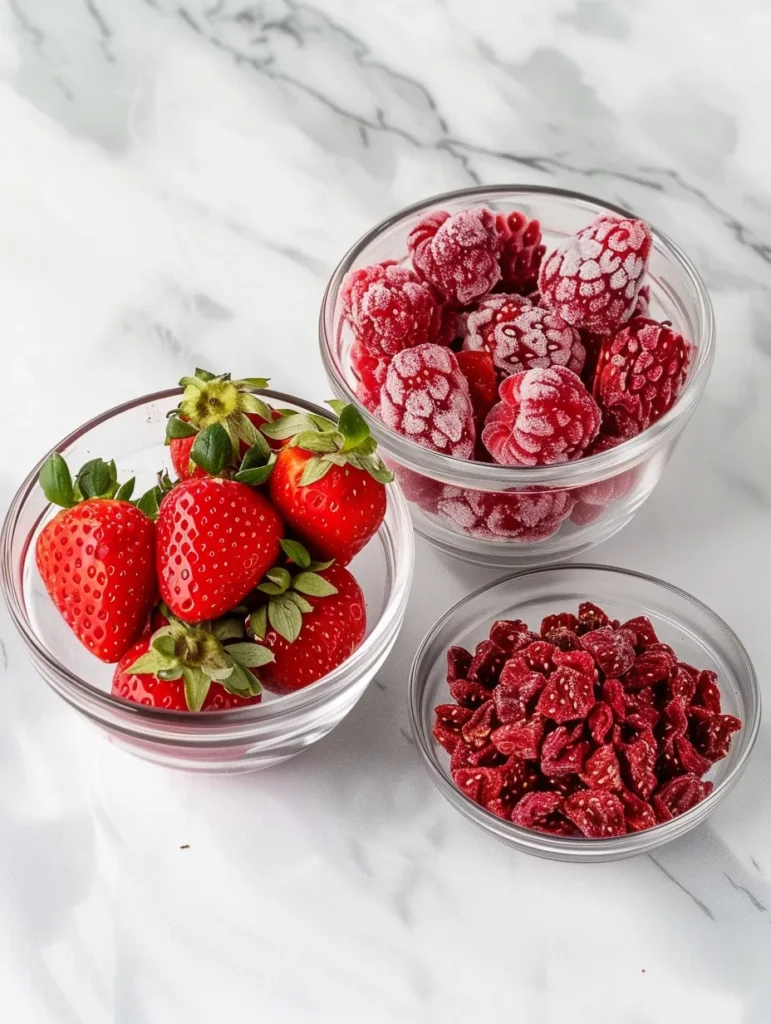
Pro tip I learned from experience: If you’re using fresh strawberries, toss them lightly in flour before folding into the batter. This prevents them from sinking to the bottom – a mistake I made embarrassingly often in my early days.
Sugar Considerations
Granulated sugar is standard, but I’ve discovered that replacing 1/4 of it with brown sugar adds subtle caramel notes that complement strawberries beautifully. This insight came during a late-night baking session when I ran low on white sugar and had to improvise.
Butter vs. Oil: The Texture Game-Changer
This took me two years to figure out completely. Butter creates better flavor and structure, while oil produces a more moist cake. My solution? Use both. A combination of 3/4 butter and 1/4 oil gives you the best of both worlds.
Eggs and Leavening
Large eggs at room temperature are crucial – cold eggs can cause the batter to seize. I learned this during one particularly frustrating baking session where three batches failed before I realized the temperature issue.
For leavening, baking powder is essential, but a small amount of baking soda helps neutralize the strawberries’ acidity and creates better browning.
Basic Techniques That Transform Good Cakes into Great Ones
The Creaming Method Mastery
After ruining more batters than I care to admit, I finally mastered the creaming technique. Cream butter and sugar for exactly 3-4 minutes until the mixture is pale and fluffy. Under-creaming creates dense cakes; over-creaming can cause collapse.
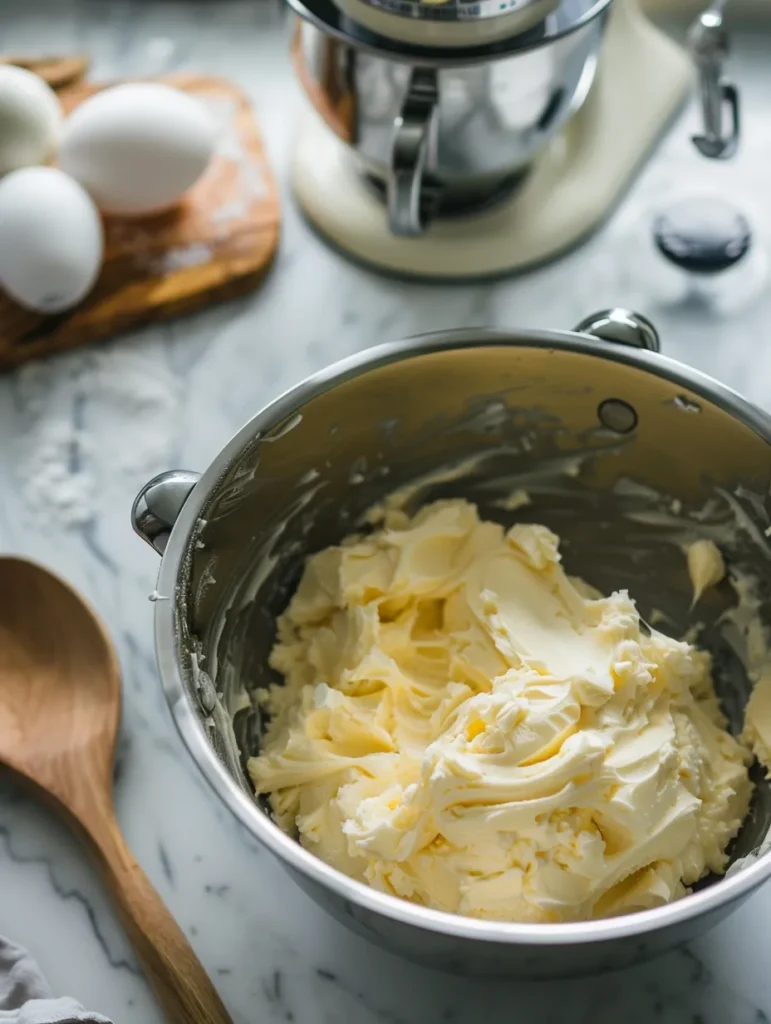
My personal timing trick: I play the same 4-minute song every time. When it ends, I know I’m done.
Mixing Strategies for Perfect Texture
The biggest lesson I learned through repeated failures: never overmix once you add flour. Mix just until ingredients are barely combined. I use a wooden spoon for the final mixing because it’s impossible to overmix with it – an old-fashioned technique that saved me from countless tough cakes.
Temperature Control Secrets
Room temperature ingredients are non-negotiable. I now take butter and eggs out 2 hours before baking – a habit developed after years of impatient disasters.
Oven temperature matters more than you think. I invested in an oven thermometer after realizing my oven ran 25 degrees hot. That explained why my cakes always looked done but collapsed when cooling.
Easy Strawberry Cake Recipes for Beginners
If you’re just starting your strawberry cake journey, these foolproof methods will build your confidence while delivering delicious results. For those who want to master the fundamentals, I always recommend starting with an easy strawberry cake recipe that focuses on technique over complexity.
The One-Bowl Wonder Method
This technique saved me during my busiest parenting years when elaborate recipes felt impossible. The one bowl strawberry cake method is exactly what it sounds like – mix all dry ingredients in one bowl, all wet ingredients in another, then combine. Simple, fast, and virtually mistake-proof.
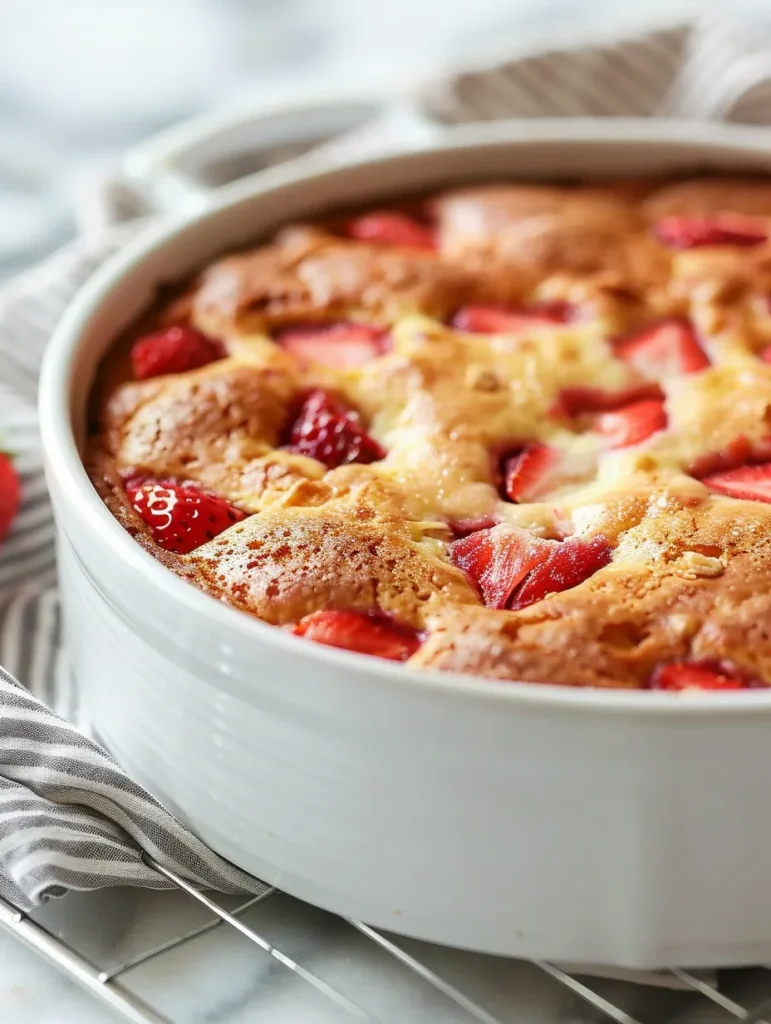
Key insight from experience: Use melted butter (cooled slightly) instead of creaming for this method. It creates a tender, moist cake without the fuss.
Quick Strawberry Cake for Busy Days
Sometimes you need cake in under two hours, including baking time. My quick strawberry cake recipe uses:
- Cake mix as a base (I’m not too proud to admit this)
- Fresh strawberry puree mixed into the batter
- Freeze-dried strawberry powder for extra flavor
This combination creates a cake that tastes completely homemade while cutting your prep time in half.
Simple Glaze vs. Elaborate Frosting
For beginners, I always recommend starting with a simple strawberry glaze. Powdered sugar, strawberry puree, and a touch of lemon juice create something elegant without the complexity of buttercream.
Personal story: My most complimented cake ever was this simple strawberry cake version served at a neighbor’s potluck. Sometimes less truly is more.
Advanced From-Scratch Methods for Serious Bakers
Once you’ve mastered the basics, these techniques will elevate your strawberry cakes to bakery quality. If you’re ready to take your skills to the next level, learning to make strawberry cake from scratch opens up endless possibilities for customization and flavor development.
Building Complex Strawberry Flavor
Layer your strawberry elements – this is the secret professional bakers don’t want you to know. Use strawberry puree in the cake, strawberry jam between layers, and fresh berries for garnish. Each element hits your palate at different moments, creating depth.
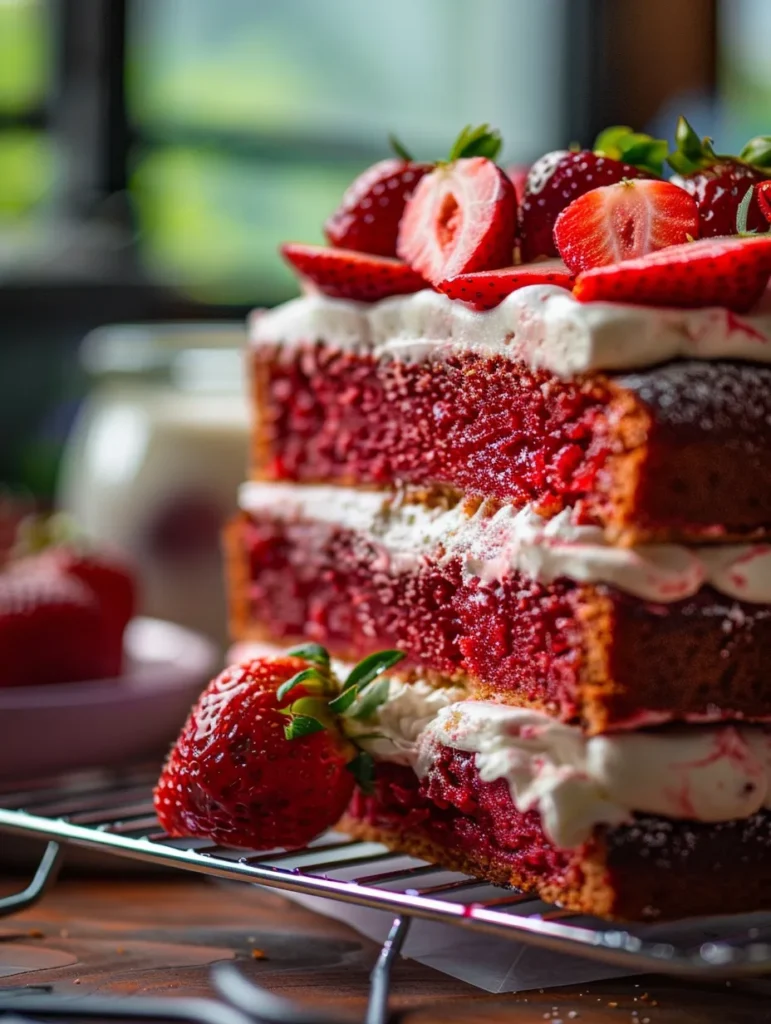
My breakthrough moment: I was trying to recreate a $60 cake from a fancy bakery. After tasting it carefully, I realized they used three different strawberry preparations. Game-changer.
The Reverse Creaming Technique
This professional method creates incredibly tender cakes. Mix flour, sugar, and butter first, then add liquids gradually. It prevents gluten development and creates a velvety crumb.
I learned this from a pastry chef who watched me struggle with dense cakes at a baking class. Her patience in teaching me this technique changed everything.
Homemade Strawberry Extract
Making your own strawberry extract intensifies flavor beyond what store-bought versions can achieve. Chop fresh strawberries, cover with vodka, and let sit for 2-3 weeks.
This project started during a pandemic lockdown when I couldn’t find strawberry extract anywhere. The homemade strawberry cake version was so superior that I never went back to store-bought.
Professional Decorating Techniques
Fresh strawberry roses became my signature after watching YouTube tutorials obsessively one weekend. Slice strawberries thinly, arrange in overlapping circles, and roll into rose shapes. Simple but stunning.
Troubleshooting Common Strawberry Cake Problems
Every disaster taught me something valuable. Here are the solutions to problems you’ll likely encounter:
Dense, Heavy Texture
Cause: Usually overmixing or old leavening agents. My solution: Replace baking powder every 6 months and use the “fold, don’t stir” method for final mixing.
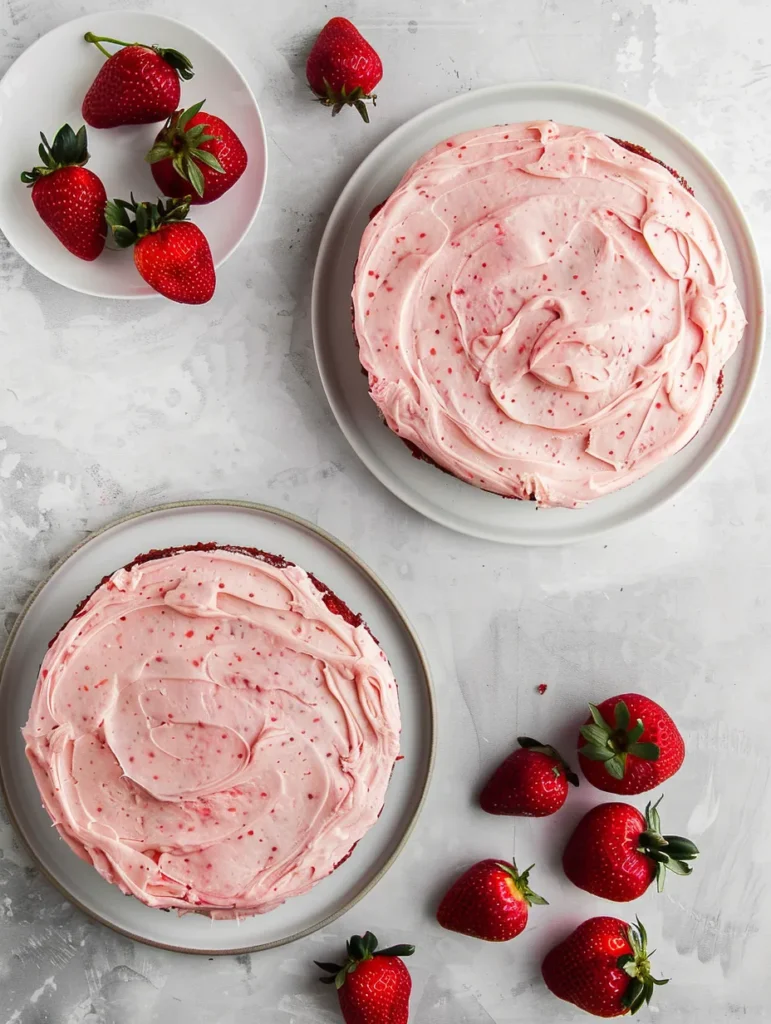
Personal failure story: I once made a strawberry cake so dense my husband joked it could be used as a doorstop. That’s when I learned to check expiration dates on baking powder.
Sunken Centers
Cause: Opening the oven door too early or temperature fluctuations. Hard-won wisdom: Never open the oven door before 75% of baking time is complete. I learned this after ruining three cakes in one day due to impatience.
Soggy Bottom Layer
Cause: Too much moisture from fresh berries. Solution: Always drain and dry fruit thoroughly, or use freeze-dried alternatives.
My “aha” moment: I started pre-baking the bottom layer for 5 minutes before adding berry-heavy batter. Problem solved.
Uneven Color Distribution
Cause: Inadequate mixing of strawberry puree. Fix: Add puree in three additions, mixing gently between each.
Flavor Too Subtle
Cause: Using only one strawberry element. Professional secret: Layer different strawberry preparations – puree, extract, and fresh berries create complexity.
Storage, Serving, and Presentation Secrets
Keeping Strawberry Cake Fresh
Room temperature storage works for 2-3 days if properly covered. Refrigeration is necessary for cream-based frostings but can dry out the cake.
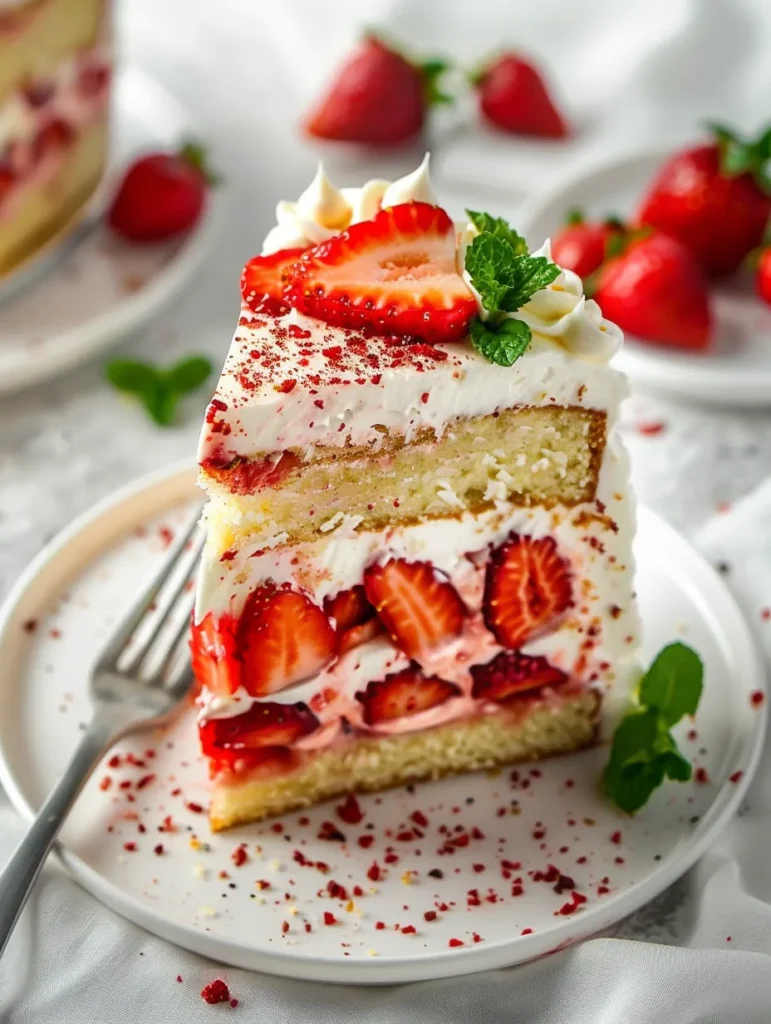
My best discovery: Store unfrosted cake layers wrapped in plastic wrap with a slice of bread. The bread maintains moisture without affecting flavor.
Make-Ahead Strategies
Cake layers freeze beautifully for up to 3 months. Wrap tightly in plastic wrap and aluminum foil. Thaw completely before frosting.
Personal time-saver: I now make and freeze layers whenever strawberries are in season, then defrost and decorate when needed.
Serving Temperature Insights
Room temperature is ideal for both flavor and texture. Cold cake mutes the strawberry flavor significantly.
Timing trick I learned: Remove from refrigerator 30 minutes before serving for optimal taste.
Presentation That Wows
Fresh strawberry garnishes should be added just before serving to prevent bleeding. Brush with light corn syrup for an elegant glossy finish.
My signature move: Dust the plate with powdered sugar and arrange berry slices in a fan pattern. Simple but restaurant-quality presentation.
Seasonal Variations and Dietary Adaptations
Spring and Summer Variations
Peak berry season (May-July) calls for showcasing fresh fruit. Layer fresh berries between cake layers and use minimal frosting to let the fruit shine.
Heat-wave adaptation: Add an extra tablespoon of cornstarch to prevent melting during hot weather transport.
Fall and Winter Strawberry Cakes
Frozen and freeze-dried berries actually work better in cold months. The concentrated flavor compensates for out-of-season fruit.
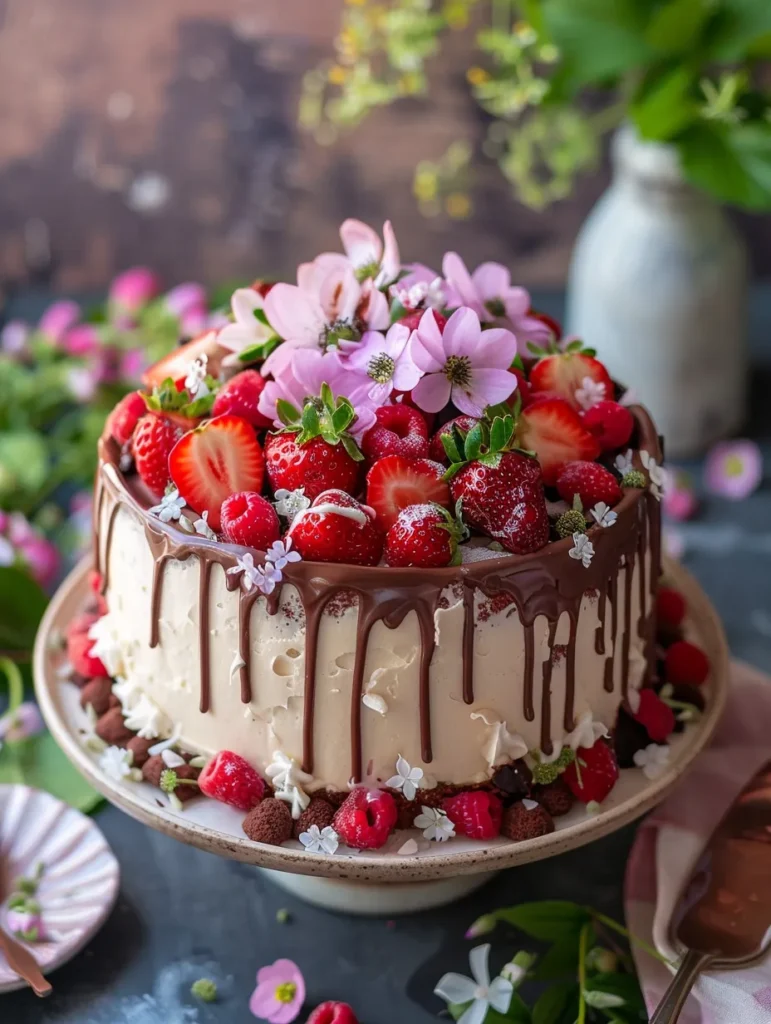
Holiday twist: Add cranberries or pomegranate seeds for festive color and tartness.
Gluten-Free Success Stories
Almond flour blend (3/4 almond flour, 1/4 tapioca starch) creates surprisingly good texture. Add an extra egg for binding.
Personal victory: My gluten-sensitive neighbor couldn’t tell the difference in my adapted version.
Dairy-Free Adaptations
Coconut oil substitutes well for butter, while cashew cream makes excellent frosting. The coconut flavor actually complements strawberries beautifully.
Reduced Sugar Options
Natural sweetness boosters: Vanilla extract, cinnamon, and lemon zest make lower-sugar versions taste complete.
Tested substitution: Replace half the sugar with unsweetened applesauce for moisture and natural sweetness.
Advanced Flavor Combinations I’ve Discovered
Strawberry-Lemon Perfection
Lemon zest in the cake, lemon curd between layers – this combination happened by accident when I grabbed the wrong extract. Best mistake ever.
Strawberry-Vanilla Bean Elegance
Real vanilla bean paste (not extract) creates complex flavor that elevates strawberry from simple to sophisticated.
Strawberry-Balsamic Surprise
A tablespoon of aged balsamic vinegar in strawberry frosting sounds weird but creates incredible depth. I discovered this at a cooking class and adapted it for cake.
Strawberry-Basil Modern Twist
Fresh basil leaves muddled into strawberry puree create an unexpectedly sophisticated flavor. Perfect for adult gatherings.
Professional Tips for Consistent Results
Measuring Success
Weight measurements beat volume every time. Investing in a kitchen scale eliminated 90% of my consistency problems.
Timing Mastery
Every oven is different. Start checking for doneness 5 minutes before the recipe suggests. A toothpick inserted in the center should come out with just a few moist crumbs.
Quality Ingredient Sources
Farmers markets for berries, specialty stores for extracts – quality ingredients make a noticeable difference in final results.
My splurge item: Madagascar vanilla extract. Expensive but worth every penny in flavor impact.
Frequently Asked Questions (Based on Years of Teaching Others)
Can I use strawberry cake mix as a shortcut?
Absolutely, but enhance it. Add fresh strawberry puree, extra egg, and real vanilla extract. Most people can’t tell the difference from scratch. For those wanting more guidance on this approach, my easy strawberry cake method using enhanced mixes delivers bakery-quality results with minimal effort.
Why do my strawberries sink to the bottom?
Coating in flour prevents sinking. Also, don’t overmix once berries are added – fold gently to maintain distribution.
How do I prevent my cake from being too sweet?
Balance with acid. A tablespoon of lemon juice or cream of tartar cuts sweetness without affecting flavor negatively.
Can I make this cake ahead for a party?
Yes, with proper technique. Bake layers up to 3 days ahead and store covered. Frost the day of serving for best appearance.
What’s the best frosting for strawberry cake?
Cream cheese frosting is classic and complements the fruit’s acidity. Buttercream works too but can be overwhelmingly sweet.
How do I know when my cake is perfectly done?
Three indicators: Cake pulls slightly from pan sides, center springs back when lightly touched, and toothpick has moist crumbs (not wet batter).
Can I freeze decorated strawberry cake?
Freeze undecorated layers only. Fresh fruit decorations don’t freeze well and will become mushy when thawed.
Why does my strawberry cake taste bland?
Layer your strawberry flavors – use puree, extract, and fresh berries. Single-source strawberry flavor often disappoints.
How do I transport strawberry cake safely?
Refrigerate until firm, then transport in a level, temperature-controlled environment. Fresh fruit garnishes should be added at destination.
What’s the secret to bakery-quality strawberry cake at home?
Quality ingredients, proper technique, and patience. Don’t rush the process – good cakes take time to develop properly.
My Biggest Mistakes (So You Don’t Have to Make Them)
Using cold ingredients ruined more batters than I can count. Everything should be room temperature for proper mixing.
Skipping the flour-dusting step for fresh berries led to countless sunken-fruit disasters.
Opening the oven door too early caused numerous collapsed centers. Patience is truly a virtue in baking.
Not tasting as I go meant missing opportunities to adjust sweetness or acidity before it was too late.
Rushing the cooling process resulted in melted frostings and structural failures more times than I care to admit.
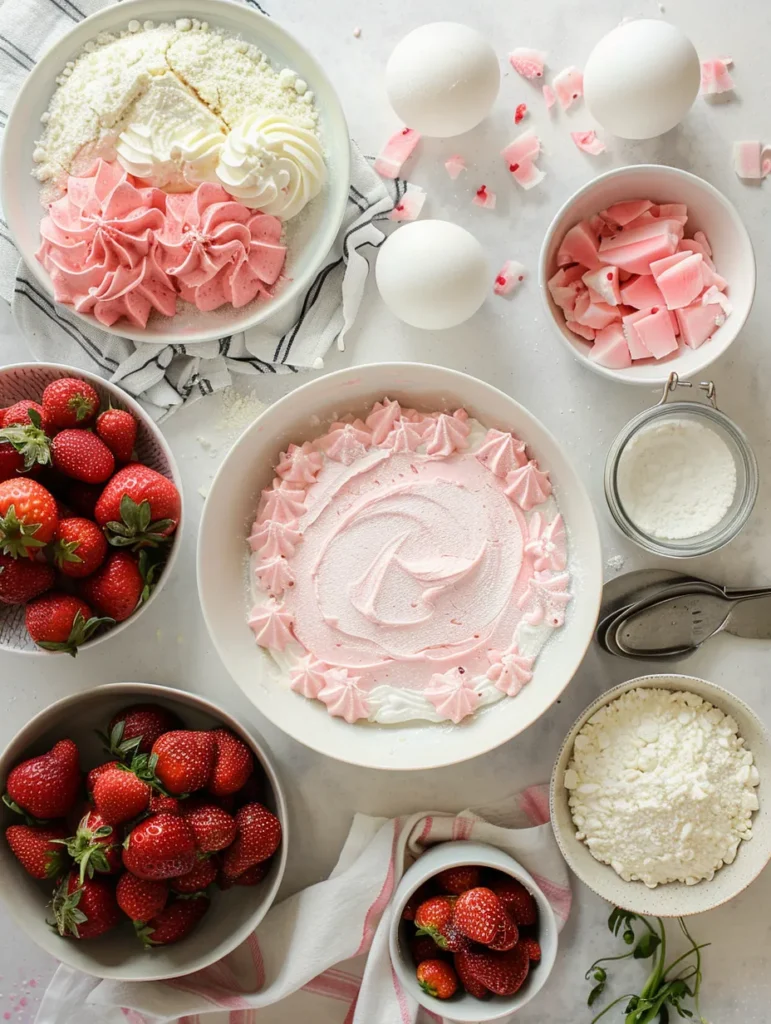
Final Thoughts: Your Strawberry Cake Journey Starts Here
After a decade of perfecting strawberry cake recipes, I can confidently say that this dessert offers something for every skill level and occasion. Whether you’re starting with a simple one-bowl method or tackling elaborate multi-layer creations, the key is understanding how strawberries behave in baking and working with their natural characteristics rather than against them.
The most important lesson I’ve learned? Every “failed” cake taught me something valuable. That collapsed birthday cake disaster launched a journey that brought joy to countless celebrations and connected me with fellow baking enthusiasts who became lifelong friends.
Start with the easier recipes to build confidence, then gradually tackle more complex techniques. If you’re a complete beginner, I recommend starting with my simple strawberry cake approach before moving to one bowl strawberry cake methods, and eventually progressing to full strawberry cake from scratch techniques. For those pressed for time, my quick strawberry cake method delivers impressive results in minimal time. Most importantly, taste everything along the way and adjust to your preferences. Baking should be joyful, not stressful.
Remember, the perfect strawberry cake isn’t about following rules perfectly – it’s about creating something that makes people smile when they take that first bite. Trust your instincts, learn from mistakes, and never be afraid to experiment.
Your strawberry cake adventure begins now. Which recipe will you try first?

